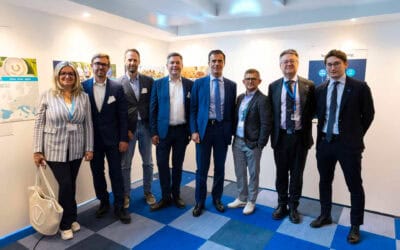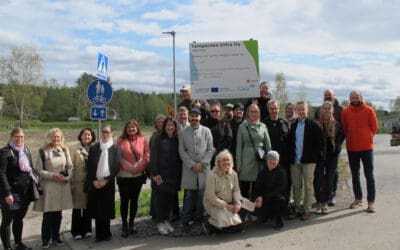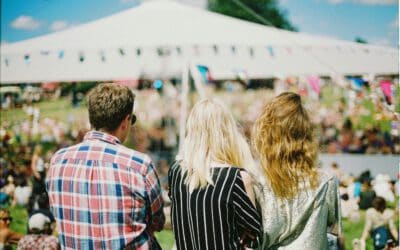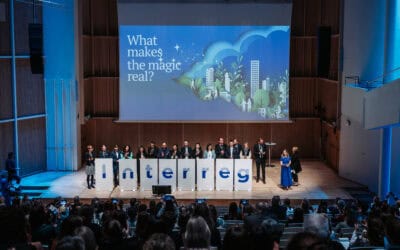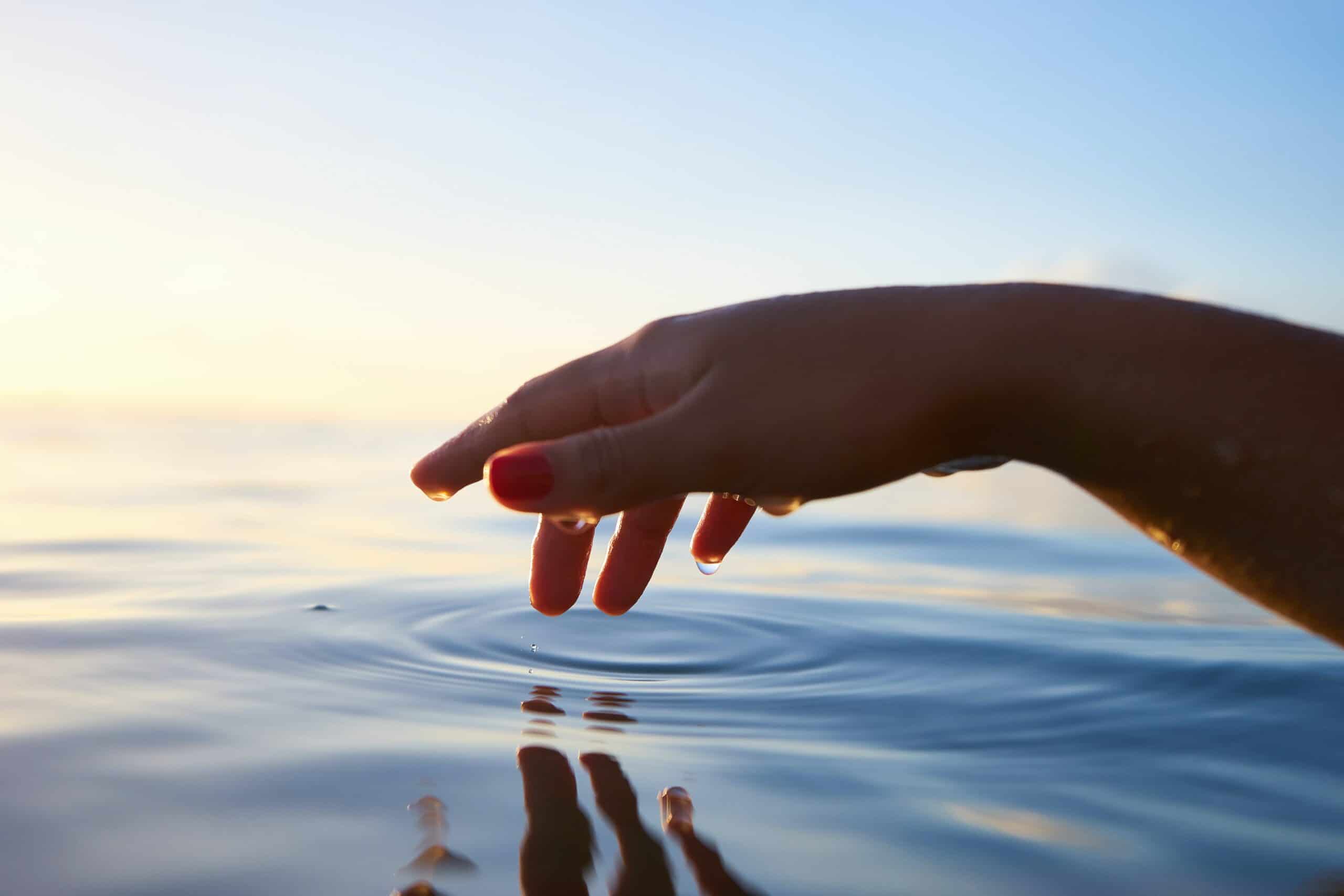
31 July 2024
Connecting with people and improving water quality in the region
written by susie hacquin
Water is at the heart of our Programme. Dive with us into the stories of two of our small projects, Lakes connect and TRUST ALUM, and see how, even with little money, we accomplish big changes for the people in the region.
Being located around the Baltic Sea, water is one of the central topics in our Programme. It is also at the heart of human life as we need water to survive. But with the increasing pollution, including PFAS, pharmaceuticals, and other hazardous substances in water, we never know what we drink, cook with, wash, go swim in. If we want to keep living as we do, we need to make sure our water is clean and not harmful. Thankfully, some of our Interreg projects tackle these challenges. We dived into the stories of TRUST ALUM and Lakes connect, two small projects tackling different water challenges in lakes in the Baltic Sea region. Read our interviews with Magdalena and Edyta from Lakes Connect and Inta and Inga from TRUST ALUM to learn about the big improvements they have brought to the region!
United by the challenges of improving water quality in lakes
Even though the challenges TRUST ALUM and Lakes connect tackle are different, one common goal is to improve water quality and connect people in joint actions. To do so, the projects were built on solid bases and representative transnational consortiums.
Because of climate change and temperature rise, more and more tourists are coming to the Baltic Sea region instead of southern Europe. This growing number of tourists increases the risks of pollution in the lakes. Improper waste management, untreated sewage discharge, nearby roads, and transport via air are sources of microplastic in lakes directly linked to tourism. However, municipalities around lakes are missing information on how to protect the lakes and mitigate tourism impact. That is the challenge project Lakes connect decided to tackle. The partners teamed up to prevent and reduce water pollution in the lakes in three Baltic Sea countries (Poland, Lithuania, and Latvia).
Edyta Woźniak-Dudzińska, Lakes connect communication manager
Water pollution doesn’t stop at borders!
Used to scientific research projects, project manager Magdalena Michalska-Kacymirow from the University of Warsaw Biological and Chemical Research Centre, explains that the team wanted to enter a kind of project more connected to the people and their needs. The project aimed at building trust between scientists and authorities: “We want to show that we can cooperate.” adds Magdalena, highlighting the mutual benefits. For this project, they needed a transnational consortium because: “Water pollution doesn’t stop at borders”. Thanks to this, the project made the lakes safer by analysing and mitigating tourism impact on the lakes, and provided municipalities with guidance and cooperation frameworks.
#DidYouKnow
Lakes connect brought together 5 partners from our region to clean and protect our lakes. With 35 benefitting organisations, 3 solutions created by the project are already in use! Learn more about the project partners and outputs on the Lakes connect project page.
The idea of the TRUST ALUM project comes from seeing local communities have their lakes in bad shape for decades. Because of past regulations on the environment that were not very strict, there is a huge anthropogenic phosphorus load in the lakes. This means that human activity like farming with fertilizers, sewage or industrial and household wastewater increased the quantity of phosphorus in lakes. This accumulation of nutrients in water is called eutrophication and it reduces greatly the level of oxygen in the water same as the increase of lakes overgrowth. As a result, thousands of fish can die, lacking oxygen to survive in winter and lakes overgrowth occurs faster than it would be in natural conditions. The project tackled this historical phosphorus pollution and worked to help reduce eutrophication and its consequences. Because the existing methods to reduce phosphorus load are expensive and not efficient enough, the partners decided to lead this project and bring in a new solution for the Baltic countries (Lithuania, Latvia and Estonia).
Inta Dimante-Deimantovica, TRUST ALUM project manager
We would like to spread this method in Baltic countries because they are players and we look at the Baltic Sea region as a one united place.
After spending 10 years in Scandinavia, project manager Inta Dimante-Deimantovica from the Latvian Institute of Aquatic Ecology knew the aluminium treatment method very well. Not used yet in the Baltic countries, this method encompasses adding aluminium salt to the water (after analysis to calculate the required dose). The mineral formed in the water binds with phosphorus, thus reducing its release and improving water clarity.
However, Inga Retike, communication manager, mentioned that “people have their assumptions about aluminium. There’s been a lot of advertising so there is already a negative opinion.”. That is where the two challenges of the project emerge: an environmental one and a social one. The environmental challenge is to start the process of mitigating the impact of eutrophication in lakes of the Baltic countries by introducing the method, but the social challenge is to build trust in this aluminum method among the people.
To overcome these challenges, the project worked with an international consortium: experienced partners from Sweden exchanged knowledge with partners from Latvia, Lithuania, and Estonia.
#DidYouKnow
Project TRUST ALUM is led by a consortium of 9 project partners from Latvia, Estonia, Sweden and Lithuania. With 25 benefitting organisations, the project already produced 4 informative documents! Discover more about the team and the outputs on the TRUST ALUM project page.
The call for specific actions
Both projects respond to the needs of people in the region. However, they both tackle very different challenges related to water quality in lakes, and these different challenges call for specific actions. And in both cases, their solutions bring benefits not only to local communities but also to everyone in the long run.
Lakes connect project was oriented toward giving authorities tools to better protect lakes. In that sense, the project created a comprehensive guide with green concepts that help municipalities. With this guide, municipalities can identify the lake pollution, set up initiatives for cooperation like green roofs, implement pilot studies, engage stakeholders with a collaborative, innovative and knowledge-based approach to manage the lake pollution. As there is no threshold for microplastic quantity in lakes, the partners also handed over to national authorities recommendations on how to change the regulation. Along with the guide and recommendations, Lakes connect set up a network between scientists, authorities, and municipalities. This network initiated a trust and installed cooperation frameworks between these actors so they can find solutions together, but also identify future problems. Thanks to the guides and network, they can work together long after the end of the project. This is why Lakes connect will benefit local communities, but also tourists, and future generations enjoying clean water in lakes.
TRUST ALUM worked on building trust in this aluminium method by working on the ground with the local communities. They participated in different events, talking with local people. They organised introduction seminars, and exchanged with municipalities, government officials, water experts, scientists, NGOs, and the public. There was a special focus on collecting all the questions from stakeholders and local communities to answer them in a FAQ page, mitigating their fear of the aluminium method. Finally, they initiated knowledge transfer from Sweden to Latvia, with the kick-off meeting in Uppsala where partners went on a boat to participate in lake treatment and to see how it works.
It is with this reach out to the local people that they managed to build trust in the method among local communities they worked with. It was successful because, as Inta explained: “I would say this trust has been increased because we already have people who call us in case something happens [at the lake] to tell us what is happening”. Trying to reach a scientific audience, they took part in several conferences and distributed newsletters. On a more practical side, they did a lot of investigation to build a safe and trustful model for the treatment in lakes and they prepared the lake areas for treatment by cutting bushes and cleaning. Starting in autumn, the lake treatment should have an impact really quickly on local communities, especially for fishers because fishes should live longer than the previous years.
Big improvement for water quality in lakes, even with little money
Based on the example of just two projects out of a handful of water-related projects in our Programme, we can clearly see that the power to improve water quality in the Baltic Sea region lies in the hands of people who care. Staying close to the needs, and working hand in hand with local communities led to tailored solutions. Most of all, however, they brought about cooperation frameworks that can easily continue to work. The knowledge exchange and trust built will resonate long after the projects are over.
If you are interested in how else our projects are improving water quality in the region, dive deeper into our project library.
More recent news
How transnational cooperation is building Europe´s future with youth
Explore how transnational cooperation is transforming Europe, from addressing climate change to fostering local economic growth. This exhibition highlights the powerful impact of collaboration beyond borders in shaping a stronger, more united future.
Painting Baltic Sea region cities blue
There is nothing more exciting than seeing an Interreg project in action. On 22 May 2025, the project City Blues showcased how it is changing areas around the city of Tampere to prepare it for the consequences of climate change better.
Overcoming Borders Together – Interreg at the Fehmarnbelt Days 2025
Join us at the Fehmarnbelt Days 2025 on June 14-16, where Interreg Deutschland-Danmark, Interreg North Sea, and Interreg Baltic Sea will showcase the power of cross-border cooperation at our joint stand.
The magic of Interreg: this is how we do it transnationally!
Almost 300 guests, the charm of Finnish Tampere and a vibrant colour palette of transnational cooperation: the Interreg Baltic Sea Region Programme Conference held on 20-22 May 2025, brought to light the benefits of Interreg and the magic behind them.



